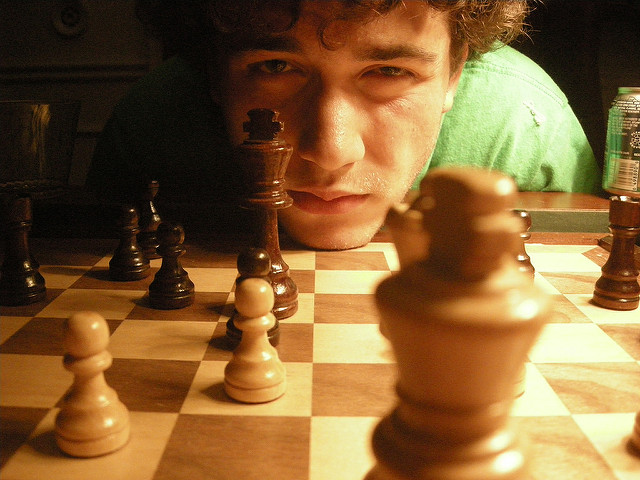Those who haven’t committed to mastery have resigned themselves to mediocrity. – Robin Sharma

He’s tired of Chess. He’s probably not willing to master it, so he will have to be content with mediocrity.
What does that mean?
While I am not usually fond of dichotomies, this could be easily be rephrased as “those who haven’t committed to mastery have resigned themselves to be something less.”
In either case, your choice is clear, you either have to commit to mastering a subject or skill, or live with the fact that you will never be a master of it. Which is fine, you can still have fun even if you’re not a master.
But what is mastery? At the highest level, a master is world-class, one of a handful of people who are at that level. At the smaller scale, it’s someone you go to with your questions.
And the mediocre? Well, that’s everybody else. For the purposes of the dichotomy, the word was probably chosen for the contrast and unease it causes. But it applies to everyone else besides the master.
Why is mastery important?
Mastery is a big word. It implies big things. But we can be masters of smaller things. If we completely understand and operate effectively and efficiently in an area of our life, we have probably achieved some level of mastery over it. Whether that is setting the table or cooking a meal, sweeping the floor or answering the phone, we can have mastery over some of the things in our lives.
Mastery is often a part of our lives where we draw pride and a sense of accomplishment. So long as we keep it to a healthy level, that’s a good and healthy thing. It can also be a starting point for exploring other areas in our lives to consider mastering. Do we want to work on a skill or knowledge base related to what we already know and do, or should we head out in a new direction? Excellent question.
But how far should we go? How much should we master? And will it ever change? I believe that the answer is not only personal, but time related. What was interesting to you as a teen, may not still interest you in your mid or later life. Skill sets evolve, interests change, and life throws new challenges at you all the time. Master what you will, when it is interesting or useful.
Where can I apply this in my life?
As an example, at one point in time, I knew just about everything there was to know about a certain category of personal computers. I coded at a level that interacted directly with the BIOS and wrote pixels directly to the screen. I built my own computers, knowing everything about them.
But times have changed and I am not willing to put in the time necessary to keep up with the industry. When the time comes, I do research on the current state of the industry, select the parts and build the computer. But that is no longer mastery. And I was just blindsided by a whole new class of video cards, after paying too much for what was nearly the best in the industry.
But we live and learn. My mastery of hardware inspired my mastery of software. The mastery of the computer hardware has slipped quite a bit, but the software mastery has only increased and spread into other aspects of software and the process of creating it. And so it has probably been with you and the things you have become good at, or even mastered, in your life.
What are some of the things you have attained mastery of, or at least closely approached mastery on a local level? Are you one of the best golfers or runners in your group of friends? Is there some topic or skill set that others ask you to use to help them, or help them by answering their questions?
These are the areas where you have emerged from mediocrity and approached or attained mastery. Consider how that skill set has changed since childhood. What did you take pride in excelling in as a child, then as a teen, and on through your life? How often did one lead to another, and how often did you take on a completely different challenge?
How has that pattern continued or changed to the present day? Do you focus on skills or knowledge? Do you move between related abilities, or do you like a fresh and unknown challenge? Or have you become less passionate of late and lost the interest in mastering anything? What would it take to light the spark and get you started again?
We can become local masters of something in our lives, even if it is as simple as being the best setter of tables in the household. Where you go from there, that is up to your drive, your ambition, your interest, and the time you are willing to invest in mastery.
The only question I have for you is this: “What is holding you back?”
From: Twitter, @andytayhk
confirmed at : It’s on his Facebook page and in his e-book (free download, search for it)
photo by Ian T. McFarland







I was once a master of cold connection wire-work for clean, uncluttered pendants. I’ve gotten away from it because my hands said, “Enough!” Instead, I’ve turned a new page. I’m just beginning my 10,000 hours of mastery of watercolors, watercolor pencils, and colored pencils. I figure I’ll be in my 80s by the time I can call myself a true master of it. (I’m 60 this year.)
Thanks for stopping by and for sharing your passion for mastery of the arts (or at least a sub-set thereof).
Keep at it, and keep learning. That is the one thing that is often forgotten. If you do the same thing for 10000 hours (or repetitions, depending on the subject), all you have perfected is that one thing, and nothing more. Learn, grow and try things. Sometimes knowing what does not work is more important than knowing just one thing that does. One is a crutch, the other is an invitation to try infinity. 8)